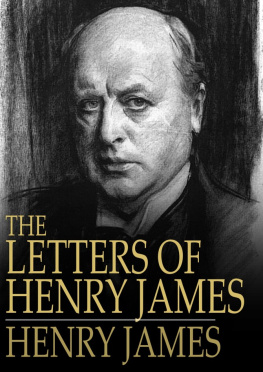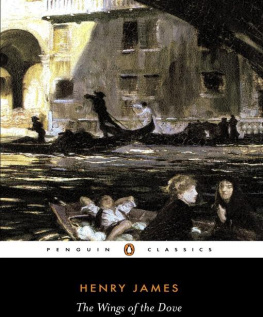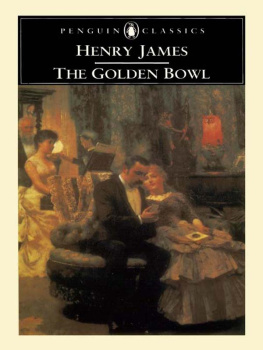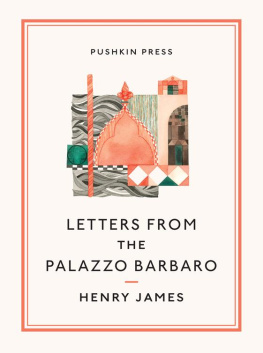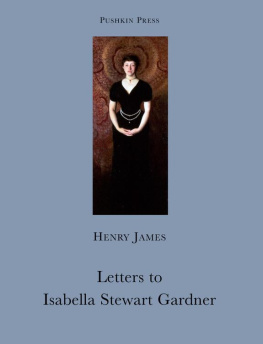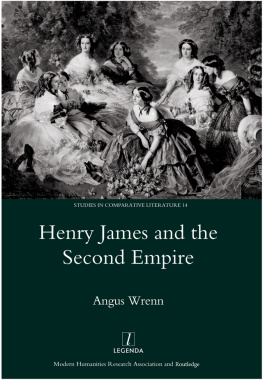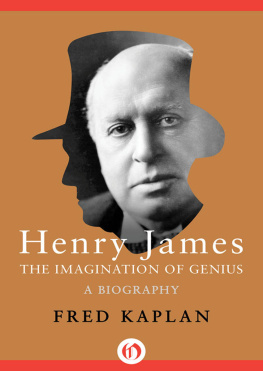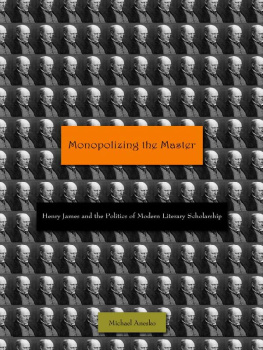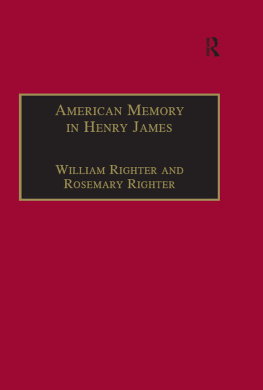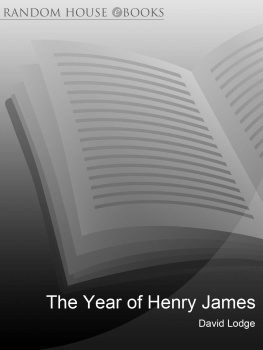Henry James - The Letters of Henry James
Here you can read online Henry James - The Letters of Henry James full text of the book (entire story) in english for free. Download pdf and epub, get meaning, cover and reviews about this ebook. year: 2016, publisher: The Floating Press, genre: Detective and thriller. Description of the work, (preface) as well as reviews are available. Best literature library LitArk.com created for fans of good reading and offers a wide selection of genres:
Romance novel
Science fiction
Adventure
Detective
Science
History
Home and family
Prose
Art
Politics
Computer
Non-fiction
Religion
Business
Children
Humor
Choose a favorite category and find really read worthwhile books. Enjoy immersion in the world of imagination, feel the emotions of the characters or learn something new for yourself, make an fascinating discovery.
- Book:The Letters of Henry James
- Author:
- Publisher:The Floating Press
- Genre:
- Year:2016
- Rating:3 / 5
- Favourites:Add to favourites
- Your mark:
- 60
- 1
- 2
- 3
- 4
- 5
The Letters of Henry James: summary, description and annotation
We offer to read an annotation, description, summary or preface (depends on what the author of the book "The Letters of Henry James" wrote himself). If you haven't found the necessary information about the book — write in the comments, we will try to find it.
Although he is regarded as one of the most important figures in American literature on account of his novels and short stories, Henry James was also a prolific writer of letters, sometimes penning as many as three or four in a single day. In this comprehensive volume, letters addressed to family members and literary figures including William Dean Howells and Robert Louis Stevenson are collected, spanning topics from the lofty to the quotidian.
The Letters of Henry James — read online for free the complete book (whole text) full work
Below is the text of the book, divided by pages. System saving the place of the last page read, allows you to conveniently read the book "The Letters of Henry James" online for free, without having to search again every time where you left off. Put a bookmark, and you can go to the page where you finished reading at any time.
Font size:
Interval:
Bookmark:

First published in 1920
Epub ISBN 978-1-77659-733-8
Also available:
PDF ISBN 978-1-77659-734-5
2015 The Floating Press and its licensors. All rights reserved.
While every effort has been used to ensure the accuracy and reliability of the information contained in The Floating Press edition of this book, The Floating Press does not assume liability or responsibility for any errors or omissions in this book. The Floating Press does not accept responsibility for loss suffered as a result of reliance upon the accuracy or currency of information contained in this book. Do not use while operating a motor vehicle or heavy equipment. Many suitcases look alike.
Visit www.thefloatingpress.com
WHEN Henry James wrote the reminiscences of his youth he shewedconclusively, what indeed could be doubtful to none who knew him, thatit would be impossible for anyone else to write his life. His life wasno mere succession of facts, such as could be compiled and recorded byanother hand; it was a densely knit cluster of emotions and memories,each one steeped in lights and colours thrown out by the rest, the wholemaking up a picture that no one but himself could dream of undertakingto paint. Strictly speaking this may be true of every human being; butin most lives experience is taken as it comes and left to rest in thememory where it happens to fall. Henry James never took anything as itcame; the thing that happened to him was merely the point of departurefor a deliberate, and as time went on a more and more masterly, creativeenergy, which could never leave a sight or sound of any kind until ithad been looked at and listened to with absorbed attention, pondered inthought, linked with its associations, and which did not spend itselfuntil the remembrance had been crystallised in expression, so that itcould then be appropriated like a tangible object. To recall his habitof talk is to become aware that he never ceased creating his life inthis way as it was lived; he was always engaged in the poetic fashioningof experience, turning his share of impressions into rounded andlasting images. From the beginning this had been his only method ofdealing with existence, and in later years it even meant a tax upon hisstrength with which he had consciously to reckon. Not long before hisdeath he confessed that at last he found himself too much exhausted forthe 'wear and tear of discrimination'; and the phrase indicates thestrain upon him of the mere act of living. Looked at from without hislife was uneventful enough, the even career of a man of letters,singularly fortunate in all his circumstances. Within, it was a cycle ofvivid and incessant adventure, known only to himself except in so far ashe himself put it into words. So much of it as he left unexpressed islost, therefore, like a novel that he might have written, but of whichthere can now be no question, since its only possible writer is gone.
Fortunately a great part of it survives in his letters, and it is ofthese that his biography must be composed. The material is plentiful,for he was at all times a copious letter-writer, overflowing into swiftand easy improvisation to his family and to the many friends with whomhe corresponded regularly. His letters have been widely preserved, andseveral thousands of them have passed through my hands, ranging from histwenty-fifth year until within a few days of his last illness. They giveas complete a portrait of him as we can now hope to possess. His was anature in which simplicity and complexity were very curiouslycontrasted, and it would need all his own power of fusing innumerabledetails into coherency to create a picture that would seem sufficient tothose who knew him. Yet even his letters, varied as they are, give fullexpression to one side of his life only, the side that he shewed to theworld he lived in and loved. After all the prodigal display of mind thatis given in these volumes, the free outpouring of curiosity andsympathy and power, a close reader must still be left with the sensethat something, the most essential and revealing strain, is little morethan suggested here and there. The daily drama of his work, with all thecomfort and joy it brought him, does not very often appear as more thanan undertone to the conversation of the letters. It was like a mysteryto which he was dedicated, but of which he shrank from speaking quiteopenly. Much as he always delighted in sociable communion, citizen ofthe world, child of urbanity as he was, all his friends must have feltthat at heart he lived in solitude and that few were ever admitted intothe inner shrine of his labour. There it was nevertheless that he livedmost intensely and most serenely. In outward matters he was constantlyhaunted by anxiety and never looked forward with confidence; he was ofthose to whom the future is always ominous, who dread the treachery ofapparent calm even more than actual ill weather. It was very differentin the presence of his work. There he never knew the least failure ofassurance; he threw his full weight on the belief that supported him andit was never shaken.
That belief was in the sanctity and sufficiency of the life of art. Itwas a conviction that needed no reasoning, and he accepted it withoutquestion. It was absolute for him that the work of the imagination wasthe highest and most honourable calling conceivable, being indeednothing less than the actual creation of life out of the void. He didnot scruple to claim that except through art there is no life that canbe known or appraised. It is the artist who takes over the deed, socalled, from the doer, to give it back again in the form in which it canbe seen and measured for the first time; without the brain that is ableto close round the loose unappropriated fact and render all itsaspects, the fact itself does not exist for us. This was the standardbelow which Henry James would never allow the conception of his officeto drop, and he had the reward of complete exemption from any chill ofmisgiving. His life as a creator of art, alone with his work, was one ofunclouded happiness. It might be hampered and hindered by externalaccidents, but none of them could touch the real core of his security,which was his faith in his vocation and his knowledge of his genius.These certainties remained with him always, and he would never triflewith them in any mood. His impatience with argument on the wholeaesthetic claim was equally great, whether it was argument in defence ofthe sanctuary or in profanation of it. Silence, seclusion,concentration, he held to be the only fitting answer for an artist. Hedisliked the idea that the service of art should be questioned anddebated in the open, still more to see it organised and paraded andpublicly celebrated, as though the world could do it any acceptablehonour. He had as little in common with those who would use the artisticprofession to persuade and proselytise as with those who would brandishit defiantly in the face of the vulgar.
Thus it is that he is seldom to be heard giving voice to the matterswhich most deeply occupied him. He preferred to dwell with them apartand to leave them behind when he emerged. Sometimes he would drop a wordthat shewed what was passing beneath; sometimes, on a particularchallenge, or to one in whom he felt an understanding sympathy, he wouldspeak out with impressive authority. But generally he liked to enterinto other people's thought and to meet them on their own ground. Therehis natural kindliness and his keen dramatic interest were bothsatisfied at once. He enjoyed friendship, his letters shew how freelyand expansively; and with his steady and vigilant eye he watched theplay of character. He was insatiable for anything that others could givehim from their personal lives. Whatever he could seize in this way wasfood for his own ruminating fancy; he welcomed any grain of reality, anyspeck of significance round which his imagination could pile its rings.It was very noticeable how promptly and eagerly he would reach out tosuch things, as they floated by in talk; it was as though he feared toleave them to inexpert hands and felt that other people could hardly betrusted with their own experience. He remembered how much of his time hehad spent in exploring their consciousness when he spoke of himself as aconfirmed spectator, one who looked on from the brink instead ofplunging on his own account; but if this seemed a pale substitute fordirect contact he knew very well that it was a much richer and moreadventurous life, really, than it is given to most people to lead. Thereis no life to the man who does not feel it, no adventure to the man whocannot see the whole of it; the greatest share goes to the man who cantaste it most fully, however it reaches him. Henry James might sometimeslook back, as he certainly did, with a touch of ruefulness in reflectingon all the experience he had only enjoyed at second hand; but he couldnever doubt that what he had he possessed much more truly than any ofthose from whom he had taken it. There was no hour in which he was notalive with the whole of his sensibility; he could scarcely persuadehimself that he might have had time for more. And indeed at othermoments he would admit that he had lived in the way that was at any ratethe right way for him. Even his very twinges of regret were not wasted;like everything else they helped to swell the sum of life, as they didto such purpose for Strether, the 'poor sensitive gentleman' of
Font size:
Interval:
Bookmark:
Similar books «The Letters of Henry James»
Look at similar books to The Letters of Henry James. We have selected literature similar in name and meaning in the hope of providing readers with more options to find new, interesting, not yet read works.
Discussion, reviews of the book The Letters of Henry James and just readers' own opinions. Leave your comments, write what you think about the work, its meaning or the main characters. Specify what exactly you liked and what you didn't like, and why you think so.

